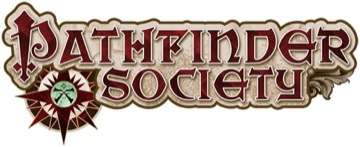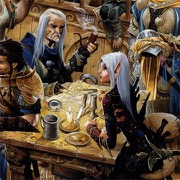Pathfinder Society 2: Boons and Sheets
Wednesday, October 10, 2018
Since the beginning of the year, many of our organized play meetings have revolved around the second edition of Pathfinder in one way or another—especially since we launched a series of sticky threads asking for your feedback. As a team we've each been monitoring a few of these threads and incorporating their ideas, critiques, and concerns into our discussions. We began revisiting those topics in blogs last month with Linda's and Tonya's examination of tiers, level gain, and the structure of the Pathfinder Society Roleplaying Guild Guide. This week we're exploring two related topics: boons and Chronicle sheets.
Boons in Second Edition
Boons were one of the first elements I brought up in the very first Pathfinder Society playtest blog because they're so important to so many people. At the time, I brought up the boon format used in Starfinder Society, which provides a character six fixed slots: Ally, Faction, Personal, Promotional, Social, and Starship. Just after the mission briefing, a player can activate one boon of each type, representing the favors she's calling in, the special equipment she's requesting, the faction she's actively representing, or the non-combatant friend that she's bringing along. In addition, there are some slotless boons that represent obligations, reminders, and other extras that we don't want taking up a space or feeling optional (e.g. "Oh, you're out of luck, Mr. Villain, for I didn't slot my 'Mr. Villain will get his revenge' boon today!").
From a design perspective, we've been really happy with Starfinder Society's model. It helps us make informed decisions about scenario power level knowing that each PC only has a handful of upgrades not normally assumed in the RPG, rather than having several dozen upgrades. This is even more important in Starfinder than it is in Pathfinder RPG's first edition because the former has fewer bonus types and thus tighter math, so it behooves us not to throw off the math too much by inundating players with modifier-altering boons. The same is true for Pathfinder's second edition, and we have the same concerns about providing so many campaign bonuses that the gameplay or character design feels drastically different from a "classic" game.
That's nice in theory, at least. At this point, we've had more than a year to see the Starfinder Society boon system in action, and I've been following the boons discussion thread since it began. There are really mixed feelings about boon slots. Some people really like them, in some cases even citing the balance-related reasons above. Some folks feel that the boon slots are too restrictive, preventing someone from using a boon on the fly that they may have kept in their back pocket. For others, the boon slots are confusing or cumbersome, and I've read some very cross commentary that slotting boons just after the mission briefing breaks immersion or grinds play to a halt. For others still, the concept of slotless boons seems very jarring, as though including slotless boons undermines the concept of boon slots as a whole.
In compiling the messageboard feedback and discussing this with the rest of the team, we see three primary ways forward: typed boon slots, universal boon slots, and limited boons. For each of these, there's still a good chance that we'd tag each boon with a type (e.g. Ally or Social) because it provides more design space for us later (e.g. an assassin kills one of your Ally boons—how morbid).
- In the Typed Boon Slots model, Pathfinder Society's boon system would look a lot like that of Starfinder Society. We would swap out one or more of the boon types (e.g. Starship) for something more befitting the setting and system. For example, we might have a Relic slot that's for especially strange or special gear (like an intelligent weapon), a Downtime slot that provides special uses of the downtime mechanic in second edition, or a Legacy slot that references some reward from a different campaign (like something carried over from first edition or earned in the Adventure Card Guild).
- In the Universal Boon Slots model, a PC would still have a limited number of slots; however, there would be no Ally boon slot, Social boon slot, or the like. Instead, every slot would be equal. Do you want to slot a pile of Ally boons? Sure. Want to have several Downtime benefits at once? Go for it. Want to represent several factions at a time, gaining all of their benefits? Okay, that would theoretically be possible, even though we haven't worked out quite what it would mean to champion multiple factions simultaneously. Whatever mix of boons you'd want to use, you could do so with universal boon slots. My suspicion is that this would also be a little easier to manage with boon slotting during an adventure, for it would be easier to have a default array of boons that a player tweaks as necessary based on the adventure.
- If we don't go with boon slots, we really have to consider a Limited Boons model to rein in the potential for mechanical bloat—the gradual increase in character power as more options or rewards become available. Limited boons could translate as awarding roughly the same number of boons as in first edition yet with each boon doing less, yet that's not a terribly fun approach; I can already hear some folks quipping that some First Edition boons are too weak as is. Instead, a Limited Boons model would be one in which boons are overall rarer so that their likelihood of stacking in a disruptive way is reduced. On the other hand, this wouldn't involve boon slots at all. The main complication is what happens to "convention boons," the incentives distributed at conventions, special events, and game days participating in the Regional Support Program. If boons are more rare overall, does that risk making convention rewards overly potent? No doubt we could find a solution, but it's one more hurdle.
What does this mean for slotless boons? Well, there would likely still be some form of Chronicle sheet tracking for events that we want to reference later, but depending on the Chronicle sheet format (see Mike's section below), there might be a means to record some of that in a non-boon format. That way, when you earn the "Grandmaster Torch's cat always hisses at you" outcome, you might not need a boon to remember it; it might instead appear in the adventure summary.
As an aside, one of the fun considerations to come out of our boon slot discussions was the idea of Events, which are ongoing situations that last for one or more scenarios. During the event (or at its end), some special effect would take place. For example, an investment might mature and give you extra gold at the end of an event, or you might earn the assistance of someone important for only a limited time. A Voluntary Event would be one that you could activate between scenarios, but it would likely occupy a boon slot during that time. A Forced Event would be one that happens whether you intended it or not, such as being the subject of negative propaganda that haunts your character for three scenarios—all the while taking up a boon slot. I'm mostly bringing these up as a possibility, and if it's something we want to explore more, we'll likely do so in an upcoming blog.
All told, there are lots of possibilities, and they intersect in many places with our exploration of Chronicle sheets. Michael Sayre takes it from here.
Chronicle Sheets
In addition to the threads we've opened to gather feedback from the community, we've worked internally to find solutions that can make Pathfinder Society more accessible, affordable, and interesting. I'll be discussing some of the proposals we have for what Chronicle sheets will look at in the new campaign and what goals the various styles are trying to address. Before I can do that to any meaningful degree though, you'll want to check out four different references: Chronicle sheet 1, Chronicle sheet 2, Chronicle sheet 3, Chronicle sheet 4, and a sample log sheet. I'll be referencing these below as well as in our Chronicle sheet survey.
One of the major goals we'd like to accomplish is maximizing the real estate on each Chronicle sheet, and we're looking to tackle that in a few different ways. First, most Chronicle sheets would present a single significant boon related to the adventure, as well as only small selection of magic items that would not commonly be available to players. Wealth would be evenly distributed across scenarios, rather than having the current situation that can occur where some adventures which give somewhat more wealth are preferable to play over other adventures that give somewhat less. Ultimately, if something appears on a Chronicle sheet, we want it to be significant and as broadly applicable as possible for the largest number of characters, though this doesn't mean we won't include particularly cool items that appeal more to (for example) fighters than wizards or vice versa when the adventure calls for it.
We quickly discovered that the community had all kinds of feedback on how Chronicle sheets are currently handled and what pieces of the Chronicle sheets people felt were pulling their weight and which were lagging behind. We also heard from a lot of event coordinators concerned with the growing costs of printing Chronicle sheets at events. In addition we're considering various proposals to allow players to experience stories in the manner most appealing to them, normalizing the value of Chronicle sheets in wealth, number and value of boons, and other areas across scenarios.
Chronicle sheet proposal 1 is the closest approximation to our current Chronicle sheet that we believe would be viable going into the new system. This full sheet style should be easily stored in a standard binder or character folio and has space for us to include a brief synopsis of the adventure in which you earned the Chronicle sheet, a small space for tracking purchases, and room for adventure-specific notes.
Chronicle sheet proposal 2 uses a 2-by-2, four-to-a-page style that should reduce costs for GMs and event coordinators who would normally be printing off 6 separate sheets of paper. Since this style only has room for a boon and item, it would need to be used in conjunction with the Scenario Logsheet (see the link above) or a similar tracking sheet.
Chronicle sheet proposal 3 features a 3-column, landscape oriented Chronicle sheet that gives us more room for boons and unique items while still reducing the print-load on GMs and event coordinators. This version would also require the Scenario Logsheet or a similar tracking sheet.
Chronicle sheet proposal 4 is a cardstock style sheet where each Chronicle sheet would be a single boon card. In this example we would generally not include magic items on Chronicles, unless the item was of Uncommon or greater rarity; instead Common rarity items would be broadly available based on your character's level. Beyond just the printing cost, though, this has the advantage of providing a smaller surface area that could let a player keep any slotted or active boons very accessible at the table.
Let us know what you think of the new proposals, and which options you'd most like to use going forward! We're including a link to both the Boons survey and the Chronicle sheet survey here, each of which include optional free response sections.
Pathfinder Society Boon Survey
Pathfinder Society Chronicle Sheet Survey
John Compton and Michael Sayre
Organized Play Lead Developer and Developer
We have updated our Privacy Policy.
Paizo.com uses cookies. You can block paizo.com from using cookies within your browser settings, but doing so will hinder site functionality.
More information can be found in our Privacy Policy.


